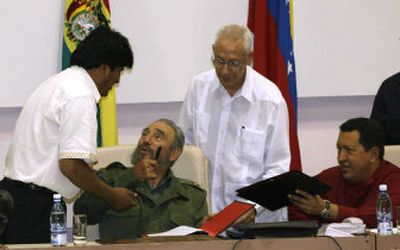Bolivia joins Cuba, Venezuela in alternative trade pact

HAVANA – Bolivia’s new left-leaning president signed a pact with Cuba and Venezuela on Saturday rejecting U.S.-backed free trade and promising a socialist version of regional commerce and cooperation.
Cuban authorities did not release copies of the so-called Bolivarian Alternative for the Americas signed by Bolivia’s Evo Morales, so its contents were unclear.
Local media reported that it had the same language as the declaration signed last year by Cuban leader Fidel Castro and Venezuela’s President Hugo Chavez, which contained much leftist rhetoric, and few specifics, but was followed by closer economic ties between the two vehemently anti-U.S. leaders.
The agreement was “a clever mixture of politics and economics, weighted toward the politics,” said Gary Hufbauer, an economist at the Institute for International Economics, a Washington think tank.
Venezuela-Cuba trade is expected to reach more than $3.5 billion this year – about 40 percent higher than in 2005. Among other measures, the deal signed between Chavez and Castro has Venezuela – the world’s fifth-largest oil exporter and a major supplier to the United States – selling 90,000 barrels a day of crude to the communist-run island at international market prices, but in exchange for services and agricultural products instead of cash.
Later Saturday, the three presidents signed a second document with more concrete proposals.
Cuba promised to send Bolivia doctors and teachers. Venezuela will send gasoline to the Andean nation and set up a $100 million fund for development programs and a $30 million fund for other social projects.
Cuba and Venezuela also agreed to buy all of Bolivia’s soybeans, recently left without a market after Colombia signed a free trade pact with the United States.
Morales, who was swept to power on a leftist platform and has long railed against American economic and drug policies, claimed during his campaign to be “the nightmare of the U.S. government.” He has since toned down his rhetoric and, like Chavez, has tried to maintain a vibrant private sector while claiming an ever-larger role in managing the economy.
The Cuba-Venezuela deal – known by its Spanish acronym ALBA, also the word for dawn – criticized Washington’s efforts to expand its free trade with Latin American countries.
The addition of Bolivia, with its natural gas reserves, will beef up the grouping’s economic potential.